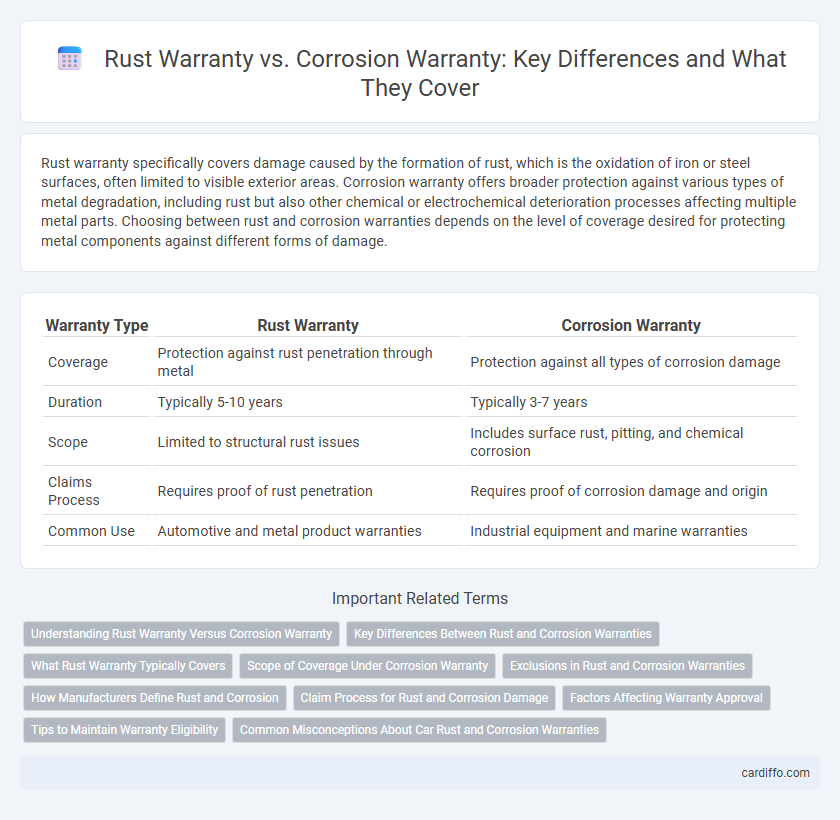Rust warranty specifically covers damage caused by the formation of rust, which is the oxidation of iron or steel surfaces, often limited to visible exterior areas. Corrosion warranty offers broader protection against various types of metal degradation, including rust but also other chemical or electrochemical deterioration processes affecting multiple metal parts. Choosing between rust and corrosion warranties depends on the level of coverage desired for protecting metal components against different forms of damage.
Table of Comparison
| Warranty Type | Rust Warranty | Corrosion Warranty |
|---|---|---|
| Coverage | Protection against rust penetration through metal | Protection against all types of corrosion damage |
| Duration | Typically 5-10 years | Typically 3-7 years |
| Scope | Limited to structural rust issues | Includes surface rust, pitting, and chemical corrosion |
| Claims Process | Requires proof of rust penetration | Requires proof of corrosion damage and origin |
| Common Use | Automotive and metal product warranties | Industrial equipment and marine warranties |
Understanding Rust Warranty Versus Corrosion Warranty
Rust warranty typically covers the formation of rust on the vehicle's surface, focusing on visible damage caused by oxidation of the metal parts. Corrosion warranty extends beyond surface rust, including protection against deeper structural damage caused by the deterioration of metal through chemical reactions with environmental elements. Understanding the distinction between rust and corrosion warranties helps vehicle owners ensure comprehensive protection against metal degradation over the warranty period.
Key Differences Between Rust and Corrosion Warranties
Rust warranty specifically covers the formation of rust on the vehicle's body panels due to paint failure or metal oxidation, often limited to perforation or through-hole rust damage. Corrosion warranty provides broader protection, encompassing various types of material degradation caused by environmental factors like moisture, salt, or chemicals, which may include surface rust, metal deterioration, and other corrosive effects beyond rust alone. Understanding these distinctions helps consumers assess which warranty offers comprehensive coverage for their vehicle's metal integrity and longevity.
What Rust Warranty Typically Covers
Rust warranty typically covers perforation caused by rust through the metal, protecting the vehicle's structural components from complete material breakdown. It excludes surface rust or cosmetic corrosion that does not penetrate the metal, focusing instead on rust that compromises safety and integrity. This warranty often includes repairs or replacements of affected panels and parts within a specified time or mileage limit.
Scope of Coverage Under Corrosion Warranty
The corrosion warranty covers damages caused by the chemical or electrochemical reaction between the metal and its environment, protecting against perforation due to rust or corrosion beyond surface discoloration. It typically includes coverage for factory-applied coatings and excludes damages from physical harm, misuse, or improper maintenance. This warranty often specifies time limits and conditions under which claims can be made, differentiating it from rust warranties that may only address surface rust.
Exclusions in Rust and Corrosion Warranties
Rust warranties typically exclude coverage for surface rust that does not penetrate the metal, focusing instead on perforation caused by corrosion, while corrosion warranties often cover a broader range of deterioration but exclude damage from environmental factors like road salt, acid rain, or mechanical abrasion. Both warranties frequently exclude damage resulting from improper maintenance, accidents, or alterations to the vehicle. Understanding the specific exclusions in rust and corrosion warranties is crucial for accurate protection of automotive metal components.
How Manufacturers Define Rust and Corrosion
Manufacturers typically define rust warranty as coverage against the formation of rust spots caused by oxidation of bare metal surfaces due to environmental exposure. Corrosion warranty often encompasses a broader spectrum, including both rust and other types of material degradation such as pitting, blistering, or perforation resulting from chemical reactions or moisture infiltration. The specific terms and definitions vary by manufacturer but generally distinguish rust as a specific oxidation process while corrosion covers overall metal deterioration.
Claim Process for Rust and Corrosion Damage
The claim process for rust warranty typically requires proof of rust-through or perforation, often validated through vehicle inspection and documentation of maintenance records. Corrosion warranty claims demand evidence of surface corrosion or paint bubbling, which is assessed through detailed photographic records and professional evaluations. Both warranties necessitate timely reporting within the specified coverage period and adherence to manufacturer-specific procedures for submitting claims.
Factors Affecting Warranty Approval
Rust warranty approval hinges on visible perforation of the metal surface due to oxidation, while corrosion warranty covers broader material degradation without necessarily causing holes. Factors influencing warranty claims include proper vehicle maintenance, environmental exposure, and adherence to manufacturer guidelines. Documentation of regularly scheduled inspections and repairs significantly improves the likelihood of warranty acceptance.
Tips to Maintain Warranty Eligibility
To maintain warranty eligibility for rust and corrosion coverage, regularly inspect your vehicle for early signs of damage and promptly address any surface scratches or chips with appropriate touch-up paints. Ensure thorough cleaning and waxing every few months to protect the metal surfaces from moisture and contaminants that accelerate rust formation. Keep detailed maintenance records and follow all manufacturer-recommended service intervals to avoid voiding warranty claims related to corrosion issues.
Common Misconceptions About Car Rust and Corrosion Warranties
Rust warranty and corrosion warranty are often mistakenly thought to cover the same damages, but rust warranty specifically addresses perforation caused by rust, while corrosion warranty covers broader issues including surface corrosion and paint damage. Many car owners assume both warranties protect against all rust-related problems, leading to confusion when certain damages are excluded. Understanding that rust warranty is limited to structural integrity and corrosion warranty may include cosmetic deterioration helps clarify coverage scope and expectations.
Rust Warranty vs Corrosion Warranty Infographic

 cardiffo.com
cardiffo.com